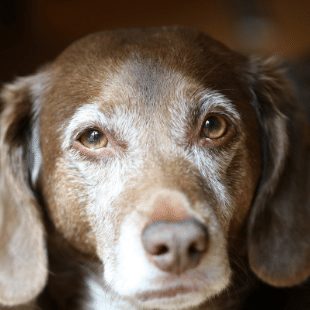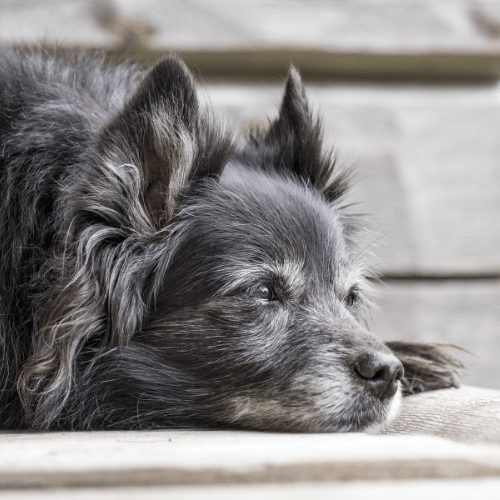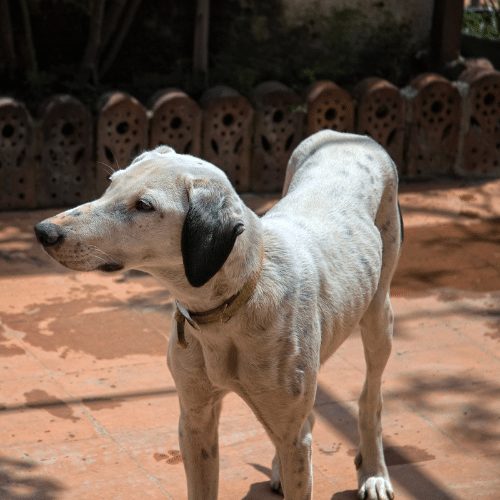Do old dogs run away to die?
April 22, 2021 2022-01-20 19:59Do you have a senior dog and have heard the tale that he will one day just run away to die? You are probably worried that he will do just that. But don’t be: Dogs do not actually run away in order to die alone. This is an old wives’ tale which confuses symptoms such as blindness and lack of orientation with the desire to die alone. Let’s look at how this myth has been perpetuated, and why it is incorrect.
Table of Contents

Do old dogs go away to die?
No – old dogs will not purposefully leave you in order to die alone. While many owners have observed the pattern of their senior dog wandering off and later being found dead, the dog does not intend to leave like this.
In order to understand why old dogs run away, let’s look at the different health problems an aging dog will experience. Even with the best supplements for senior dogs, we cannot stop or reverse aging in our canine companions.
A very old dog:
- Has often lost the ability to see and hear – if not completely, those senses are at least decreased
- Can experience confusion caused by canine dementia. He might be pacing, panting or look “lost” even though he is in his own home
- Has lost the ability to know where he is and how to get home
- Is unable to jump up anymore and will require a specialized dog ramp to get in your car or on the couch
While younger dogs that run away usually find their way back home, an old dog is not able to. If the owners do not find him in time, he will become dehydrated and weak and – sadly – pass away.
If your old dog wanders off, it is never a sign that he wants to “die alone”. Rather, you need to confine him to a safe and secure area from which he cannot escape. He is likely not strong enough to survive several nights away from home.

How do I know my old dog wants to die?
Dogs do not have a sense of death or of “wanting to die”. The decision about whether or not to euthanize your dog should be based on his quality of life.
Quality of life is determined by:
- Your dog’s pain level
- Your dog’s ability to move around
- Your dog’s interest in food and drink
- Your dog’s level of being continent (does he hold urine and feces or does he pass them without control)
- How well your dog is breathing
- Your dog’s overall behavior (is he hiding, is he aggressive towards other pets, does he seem apprehensive against your touch – or is he happy to be around you and be petted)
- Your ability to handle your dog’s physical state and his care
If your dog does not have much quality of life left, it might be time to help him transition to a more peaceful state. However, this is a decision you as the owner (perhaps in combination with your dog’s vet) have to take. It is not a choice that your dog is capable of making – please do not wait for him to wander off and die alone.
What happens when an old dog runs away?
If your senior dog runs away, he will likely not find his way back home by himself. Chances are that he will wander around aimlessly and eventually give up and lie down from exhaustion. Because old dogs often have renal disease (kidney failure) and drink increased amounts of water, he will also be very thirsty. He might be too hot or too cold. Eventually he will become unconscious from dehydration and pass away. This is not a kind death.
Your old dog needs water, food, shelter and a loving home. Please do not allow him to simply run away and die alone. It is not humane and you need to make sure that he is not able to leave your home or property. When the time comes for him to pass, it should be done with a veterinarian and surrounded by the people who love him. Not all alone, in the woods, thirsty and freezing!
How to safely keep your old dog
Because senior dogs can become disoriented (due to dementia or simply lack of vision and hearing), you need to confine them to a safe and restricted area.
This does not need to be a huge space. In fact, they are usually happy to have a small yard and a warm place to sleep inside. Provide a clean bed and fresh water for your dog at all times. Do not let your old dog have access to an area from which he might escape. He should never be in an unfenced yard.
If you doubt your dog’s ability to come back to you once off-leash, you should only take him on on-leash walks. Do not let him off the lead and risk losing him on a trail or at the park!

The bottom line
Old dogs do not run away on purpose because they want to die alone. They do however become disoriented and often are unable to find their way home after leaving their property. You need to make sure that your old dog is in a fenced, secure area at all times.
If he does run away, you need to go and find him. Do not simply assume he will die peacefully – he won’t! If he is lost, he will probably die from exhaustion and dehydration, possibly paired with heat stroke or hypothermia. This is not humane and your dog deserves to go surrounded by his family, in a peaceful and comfortable environment.

